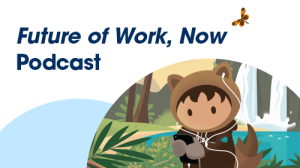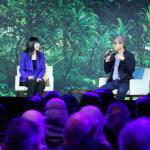As the digital imperative reshapes how we work and connect with our customers, marketers everywhere are experimenting and pushing the boundaries of digital technology. From pivoting to online events to driving hyper-personalisation, they’re spearheading a massive shift in customer engagement.
Wendy Walker, Senior Director Marketing Asia Pacific at Salesforce, joined us on the Future of Work, Now podcast to talk about this shift. She also discusses how marketers are championing equality and innovation.
Here are key takeaways from the conversation:
Diversity and inclusion are key to innovation
Wendy is passionate about the constant change and progression that comes with working as a marketer in the technology industry. Even so, she shared that the pandemic was a reminder that change can come from absolutely anywhere and have a dramatic impact on the way we work.
Marketers need to be ready to adapt and innovate, and the role of diversity is crucial.
“Our teams are more agile than ever and we all know that innovation can give us a competitive edge. What many leaders forget is that diversity is a key ingredient in innovation. This includes the diversity of thought and the diversity of perspective that comes from an inclusive culture where everyone feels they have a voice.
“For me, this emphasises the point that diversity and inclusion are not nice-to-have considerations. They are key drivers of innovation and collaboration, and can have a major impact on business success,” said Wendy.
Representation in marketing
Like others within the media industry, marketers can play a pivotal role in promoting and celebrating diversity within our broader society. It’s a role that Wendy takes seriously as a passionate advocate for equality both inside and outside of the workplace.
“I am acutely aware of the powerful impact marketing can have on society and that is why I am very intentional about ensuring the messages we send out are truly representative of the communities we serve at Salesforce.
“Everyone should see themselves reflected in popular culture and that includes seeing themselves represented in advertising. It helps people to feel seen and heard and hopefully empowered and inspired as well,” said Wendy.
Authentic representation is becoming the standard and Wendy said that marketers are in a unique position to challenge and influence perceptions of what society should look like.
“What does a doctor look like? What does an athlete look like? Or what does love look like? We as marketers can help to define these things and ensure inclusivity,” said Wendy.
Achieving customer connection
Marketers are adept at understanding and influencing customer behaviour, which puts them in a prime position to help businesses recover and grow post-pandemic.
“It’s become tougher than ever to connect with our customers, but if we understand what they are going through, we can send more relevant messages out to the market and show that we care. I talk a lot about empathy in marketing; it’s what we need to achieve a real connection with our customers,” said Wendy.
Of course, the touch points used to engage with customers are also important. The last year has led marketers to accelerate their move to digital and build new skills for the future. They have also been experimenting with personalisation and automation for more sustainable and scalable engagement.
“There’s been so much learning for everyone over the last twelve months, which is evident in how marketers relate to customers, address their needs for accessibility, and execute in a number of other different ways.

























